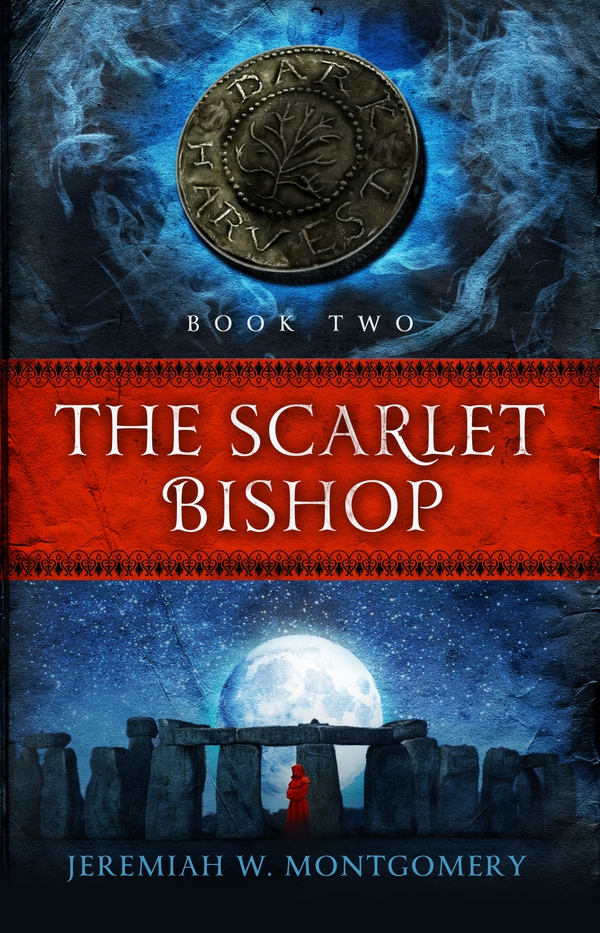It’s Jeremiah W. Montgomery’s turn to answer some questions about himself. He is the author of the Dark Harvest Trilogy: The Dark Faith, The Scarlet Bishop, and The Threefold Cord (July 2014).

- When did you first want to write a book?
“My second grade reading teacher did three things that turned me into a writer of fantasy. First, she made us read The Lion, the Witch, and the Wardrobe by C.S. Lewis. Second, she made us write. It was for her class that I wrote my first two fictional stories: an Indiana Jones knock-off, and a detective story situated at the North Pole. Third, this teacher had an electronic typewriter that allowed me to see my own words “in print.” From that period forward, I hoped someday to publish a real book.”
- Do you have a specific spot that you enjoy writing most?
“I enjoy working at the local Barnes & Noble café. It’s away from my home office, which keeps me from the distractions of my bookshelves. On most days, it also possesses a comfortable level of white noise. The staff are friendly, and they serve good coffee.”
- What book are you reading now?
“I am currently reading five books! For my ministry, I’m reading City of God by Augustine and the first volume of Reformed Dogmatics by Herman Bavinck. For myself, I’m reading the second volume of D. Martyn Lloyd-Jones by Iain Murray. With my older children, I’m reading 100 Cupboards by N.D. Wilson. And with my younger children, I’m reading The House at Pooh Corner by A.A. Milne.”
- Other than the Bible, do you have a favorite book?
“I think very highly of The Wind in the Willows by Kenneth Grahame and (for grown-up readers) the Aubrey/Maturin novels by Patrick O’Brian.”
- What advice would you give to aspiring writers?
“First, determine what it is that you want to say to the world. By this I don’t mean characters, plot, or the like. Rather, what is the theme or the point of your story? Every good story is going somewhere in order to say something. Create a rich world, introduce sub-theme, but make sure you have something clear to say. Until you do, you’re not ready to write.
Second, labor to write good prose. The best idea in the world can be wrecked by poor writing. Cheesy fiction is bad fiction, even if you call it “Christian fiction.”
Third, maintain clear standards of good and evil. Characters must face moral dilemmas, but there must be no moral fuzziness. The sinfulness of angels and men should be taken seriously, along with the struggles faced by those who live in a world scarred by sin and its consequences.
Fourth, make your fictional characters and world believable. Even supernatural elements must follow rules. Make these clear to your reader and make sure you follow them as an author. There is an unspoken agreement between author and reader. The reader will suspend his or her disbelief in order to enter into the author’s world – but only so long as the author doesn’t break the spell by cheating.
Finally, if you are writing Christian fiction be particularly wary of writing conversions that are too-quick. People coming to faith often struggle. Be realistic.”
- Do you have a favorite character or one that you relate to most in your book(s)?
“I wish I had Donnach’s joy in believing, Morumus’s skill with languages, and Oethur’s courage in the face of enemies. But I think I relate most to Urien. The gospel is very simple, but that doesn’t mean that believing is always easy.”
- What is your favorite food?
“My family has an excellent recipe for squash soup, and I delight in most things curry.”
- What famous person (living or dead) would you like to meet and why?
“I would like to meet John G. Paton, missionary to the New Hebrides. Read his autobiography, and you’ll know why.”
- If you have a favorite book of the Bible, what is it and why?
“Ecclesiastes is my favorite book of the Bible. It shows us that Christians can be painfully honest about life while still remaining vigorously hopeful – and it reminds us to live in light of eternity. As Paul Helm wrote recently on his blog, Ecclesiastes teaches us that “while we are to live in the present, we are not to live for the present.””
=======================================================================
- How can readers discover more about you and your work?
I serve as a church planter for the Orthodox Presbyterian Church in State College, Pennsylvania. Interested readers may visit our church website at www.resurrectionopc.org or check out our Facebook page at www.facebook.com/resurrectionopc.
=======================================================================

Comments